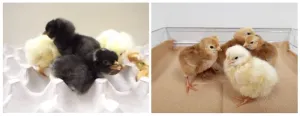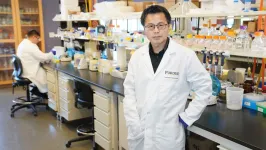(Press-News.org) A new study from North Carolina State University finds carrying pollen is a workout that significantly increases the body temperature of bumble bees. This new understanding of active bumble bee body temperatures raises questions about how these species will be impacted by a warmer world due to climate change.
Spend a bit of time at a nearby flower patch and you will spot a fuzzy bumble bee with yellow bumps on her back legs. These yellow bumps are solid packets of pollen that have been carefully collected during the bees’ foraging trip for transport back to their nests. And while bees may seem to move from flower to flower with ease, these pollen packets can weigh up to a third of their body weight. This new study found that – after accounting for environmental temperature and body size – the body temperature of bumble bees carrying pollen was significantly hotter than the temperature of bees that were empty-legged.
Specifically, the researchers found that bee body temperatures rose 0.07°C for every milligram of pollen that they carried, with fully laden bees being 2°C warmer than unladen bees.
Like ants and other ectotherms, the body temperature of a bumble bee is mostly determined by the environment. Among bees, bumble bees are exceptionally cold tolerant and will shiver to warm up during cold days. However, not much is known about how they can tolerate heat. Since pollen-laden bumble bees are hotter than unladen ones, this could mean that carrying a full load of pollen on a hot day puts bees at greater risk of reaching the potentially lethal end of their temperature tolerance.
“Getting warmer from carrying pollen could put bumble bees in the range of those stressful, critically hot temperatures,” says Malia Naumchik, a former applied ecology minor undergraduate and lead author of the study. “This has important implications for bumble bees and climate change. As environmental temperatures increase, the bees’ operational range of temperatures could shrink significantly.”
Bumble bee numbers and species diversity is on the decline across the world, particularly in areas that are warming up due to climate change. But the exact mechanics of how climate change is impacting bumble bees are not yet fully understood. This finding could be one piece of that puzzle.
Pollen is crucial for every stage of a bumble bee’s life history. Newly emerged queens in the spring need to feed themselves and then feed their sister workers. Those workers then take over feeding the colony, larvae and future queens. Without pollen, or enough pollen, colonies will not thrive – risking future colonies and the species as a whole. This may also have implications for pollination in general, and could impact agriculture and ecosystems alike.
“We need to know how bumble bees may change their behavior, to better understand how this could affect how much pollen they collect and how much pollination they perform during hot days,” says Elsa Youngsteadt, a professor in applied ecology and supervisor of Malia’s research. “Whether it’s carrying smaller loads of pollen or foraging for shorter times, it could result in less pollen coming to the colony and fewer plants being pollinated. This is particularly important since bumble bees provide critical ecosystem services and are key pollinators for agriculture, especially in the United States and Europe.”
The paper, “Larger pollen loads increase risk of heat stress in foraging bumblebees” will be published May 17 in Biology Letters. This study was supported by North Carolina State University, USDA National Institute of Food and Agriculture award #2020-67013-31916, and USDA National Institute of Food and Agriculture Hatch Project #1018689.
END
Study finds carrying pollen heats up bumble bees, raises new climate change questions
2023-05-17
ELSE PRESS RELEASES FROM THIS DATE:
Pre-primary education “chronically” underfunded as richest nations drift further away from 10% aid goal
2023-05-17
International aid for pre-primary education has fallen further behind an agreed 10% spending target since the COVID-19 outbreak, according to new research.
The report, compiled by academics at the University of Cambridge for the global children’s charity, Theirworld, highlights “continued, chronic” underfunding of pre-primary education in many of the world’s poorest nations, after years of slow progress and pandemic-related cuts.
Early childhood education is widely understood to be essential to children’s successful cognitive and social development and to breaking cycles of poverty in poorer countries. ...
Confirming the safety of genetically edited allergen-free eggs
2023-05-17
Researchers have developed a chicken egg that may be safe for people with egg white allergies. Chicken egg allergies are one of the most common allergies in children. Though most children outgrow this allergy by age 16, some will still have an egg allergy into adulthood. Egg white allergies can cause a variety of symptoms, including vomiting, stomach cramps, breathing problems, hives, and swelling and some people with egg white allergies are unable to receive certain flu vaccines.
Using genome editing technology, researchers have produced an egg without ...
Otago researchers reveal impact of ancient earthquake
2023-05-17
By combining the scientific powerhouses of genetics and geology, University of Otago researchers have identified a new area of coastal uplift, which had been hiding in plain sight.
The previously unknown region of earthquake uplift, in Rarangi, Marlborough, was discovered using a combination of new data from laser mapping and kelp genetics.
Co-author Professor Jon Waters, of the Department of Zoology, says the study gives new insights into the changes in Aotearoa’s landscapes and the recent history of earthquake impacts.
“In a geologically well studied country like New Zealand, there ...
ESHRE publishes recommendations to tackle environmental threats to fertility and reproductive health
2023-05-17
Political and legislative action is urgently needed to respond to threats posed by the link between environmental factors and widespread infertility, says the European Society of Human Reproduction and Embryology (ESHRE) today (Wednesday).
This is one of the (8) recommendations outlined in a list of statements published by ESHRE for the first time. The aim is to draw attention to the growing threat from climate change, pollutants, hormone-disrupting chemicals, toxic substances, and other related risks.
The ...
What’s a park worth to the economy?
2023-05-17
A new framework developed by University of Waterloo researchers demonstrates the significant economic health savings and benefits from urban park investments.
In the first case study of its kind in Canada, researchers looked at Peterborough’s new Quaker Foods City Square park, which cost taxpayers $6.4 million, and have estimated the economic value of physical and mental health benefits that could come from it at more than $4 million per year. The framework considers the health savings associated with improved mental health and better air quality, the ...
New liquid biopsy method offers potential fornoninvasive Parkinson’s disease testing
2023-05-17
New liquid biopsy method offers potential for noninvasive Parkinson’s disease testing
EVtrap technology identifies proteins from brain cells in urine samples
WEST LAFAYETTE, Ind. – A team led by researchers at Purdue University and Purdue spinoff company Tymora Analytical Operations has developed a technique that may reveal signs of Parkinson’s disease in urine samples.
The technique gives researchers a chance to see if LRRK2 (leucine-rich repeat kinase 2) proteins, which are linked to Parkinson’s disease, and their downstream pathways are altered in samples from Parkinson’s patients. The method could eventually lead ...
GW to co-lead a new $20 million NSF AI institute
2023-05-16
WASHINGTON (May 16, 2023) - The George Washington University is co-leading a multi-institutional effort supported by the National Science Foundation (NSF) that will develop new artificial intelligence (AI) technologies designed to promote trust and mitigate risks, while simultaneously empowering and educating the public.
The NSF Institute for Trustworthy AI in Law & Society (TRAILS) announced on May 4, 2023, unites specialists in AI and machine learning with systems engineers, social scientists, legal ...
Discrimination, crime and suicidal thoughts associated with greater odds of firearm ownership among Black adults
2023-05-16
Black adults – particularly Black women – with higher levels of education and experiences of discrimination and crime are more likely to own a firearm, according to a study by the New Jersey Gun Violence Research Center at Rutgers.
In a new study appearing in the Journal of Clinical Psychology, researchers found that Black adults who endorsed firearm ownership were more likely to grow up in homes with firearms, had previously shot a firearm and planned to acquire a firearm in the coming year.
“The higher rates of firearm ownership among highly educated Black women were somewhat surprising to us,” said Michael Anestis, executive director ...
Some young cancer survivors face higher risk of premature heart failure
2023-05-16
Mean age at diagnosis of heart failure was 32 years old
First study to estimate risk of heart failure among young adult cancer survivors treated with this category of chemotherapy
Study raises awareness for patients, clinicians to monitor for heart failure symptoms, consider strategies for prevention
CHICAGO --- Imagine surviving cancer only to learn the drug that saved your life has introduced a completely different health risk: heart failure.
A new Northwestern Medicine study has found young adult cancer survivors (between 18 and 39 years old at diagnosis) were at higher risk (2.6 times) of heart failure when treated with anthracyclines, a specific category ...
New research sheds light on how shift work may influence fertility
2023-05-16
Only four weeks of shift work-like patterns in female mice are enough to disrupt their biological clock and reduce fertility, according to research presented at the 25th European Congress of Endocrinology. The findings help scientists better understand how circadian disturbances impact female fertility, which could eventually lead to future prevention strategies for women working in non-standard work schedules.
The circadian rhythm is generated by the body’s internal clocks which are synchronised to a 24-hour period, mostly by changes in light across days. These clocks regulate various biological functions and processes, including the sleep-wake cycle, ...



